#christopher hitchens
Explore tagged Tumblr posts
Text
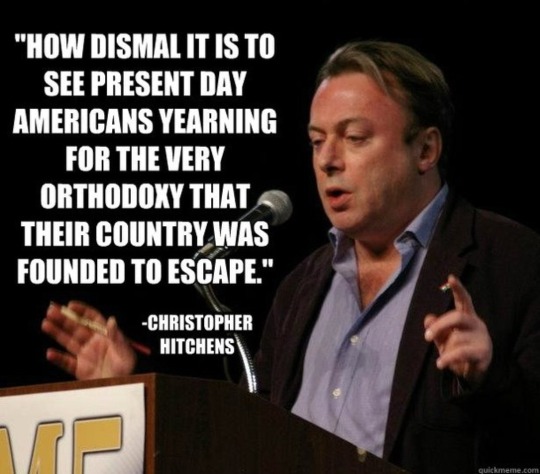
We created the United States, not the Church of America. We said President, not King.
353 notes
·
View notes
Text
37 notes
·
View notes
Text

"The Catholic Church is a medieval relic that should have no place in the modern world." -- Christopher Hitchens
#Christopher Hitchens#catholic church#catholicism#catholic#roman catholic#religion#religion is a mental illness
139 notes
·
View notes
Text

I proprietari di cani avranno notato che, se si forniscono ai cani cibo e acqua e riparo e affetto, i cani penseranno che i proprietari sono Dèi. Mentre i proprietari di gatti sono costretti a rendersi conto che, se si forniscono ai gatti cibo e acqua e riparo e affetto, i gatti trarranno la conclusione di essere loro degli Dèi.
Christopher Hitchens
41 notes
·
View notes
Photo

#atheism#buddhism#christianity#judaism#islam#catholicism#mormonism#baptist#jehovah witness#scientology#Religion#Christopher Hitchens
280 notes
·
View notes
Text
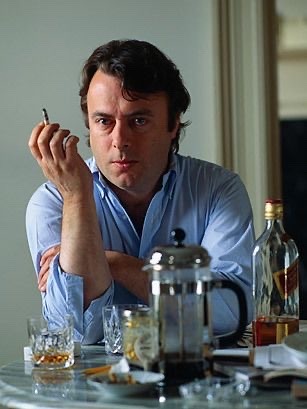
“Those who are determined to be ‘offended’ will discover a provocation somewhere. We cannot possibly adjust enough to please the fanatics, and it is degrading to make the attempt.” — Christopher Hitchens
82 notes
·
View notes
Photo
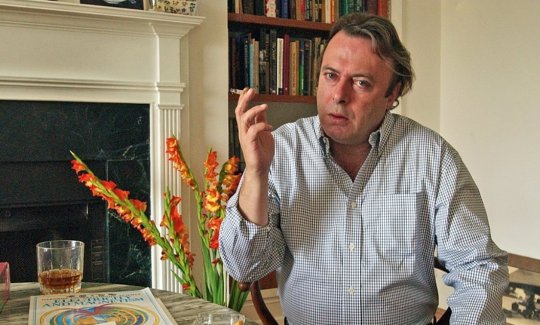
I have one consistency, which is being against the totalitarian - on the left and on the right. The totalitarian, to me, is the enemy; the one that's absolute, the one that wants control over the inside of your head, not just your actions and your taxes.
- Christopher Hitchens
#hitchens#christopher hitchens#quote#politics#ideology#totalitarianism#left vs right#left totalitarianism#right totalitarianism#totalitarian state#freedom#liberty#freedom of speech#society#culture#icon
191 notes
·
View notes
Text

10-29-24 | misterlemonztenth.tumblr.com/archive
16 notes
·
View notes
Text
“If Jews born in Brooklyn have a right to a state in Palestine, then Palestinians born in Jerusalem have a right to a state in Palestine.”
Christopher Hitchens was a British journalist and author who wrote 18 books on faith, culture, politics, and literature.
In an interview with Charlie Rose on November 6th, 2001, he expressed his dislike/ for the original concept of Zionism and his advocacy for a Palestinian homeland.
21 notes
·
View notes
Text

I miss Christopher Hitchens.
421 notes
·
View notes
Text
I don’t think god is real
After listening to Christopher hitchens
I used to be agnostic
I used to think to myself “eh he might be real or he might not be real”
But then I listened and thought about it
Who actually wants religion to be true?
#christianity#buddhism#jesus christ#faith in jesus#jesus loves you#jesus#jesussaves#jesus is coming#jesusislord#belief in jesus#jesusisgod#religion#anti religion#agnostic#agnostisizm#buddha#buddhist#islam#islamic#welcome to islam#convert to islam#revert islam#islamdaily#islampost#islamislove#christopher hitchens
7 notes
·
View notes
Text

"I learned that very often the most intolerant and narrow-minded people are the ones who congratulate themselves on their tolerance and open-mindedness." -- Christopher Hitchens
#Christopher Hitchens#intolerant#tolerance#open mindedness#open minded#narrow minded#hypocrisy#religion is a mental illness
24 notes
·
View notes
Text
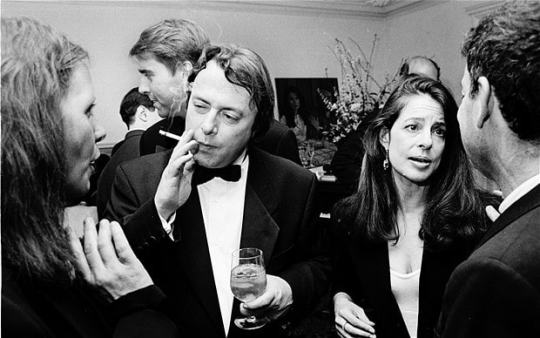
Christopher Hitchens and his wife Carol Blue at a Washington Correspondents Dinner in 1995 (Photo by Dafydd Jones)
"I miss his perfect voice. I heard it day and night, night and day. I miss the first happy trills when he woke; the low octaves of “his morning voice” as he read me snippets from the newspaper that outraged or amused him; the delighted and irritated (mostly irritated) registers as I interrupted him while he read; the jazz-tone riffs of him “talking down the line” to a radio station from the kitchen phone as he cooked lunch; his chirping, high-note greeting when our daughter came home from school; and his last soothing, pianissimo chatterings on retiring late at night.
I miss, as his readers must, his writer’s voice, his voice on the page. I miss the unpublished Hitch: the countless notes he left for me in the entryway, on my pillow, the emails he would send while we sat in different rooms in our apartment or in our place in California and the emails he sent when he was on the road. And I miss his handwritten communiqués: his innumerable letters and postcards (we date back to the time of the epistle) and his faxes, the thrill of receiving Christopher’s instant dispatches as he checked-in from a dicey spot on some other continent.
The first time Christopher went public and wrote about his illness for Vanity Fair, he was ambivalent about it. He was intent on protecting our family’s privacy. He was living the topic and he didn’t want it to become all-encompassing, he didn’t want to be defined by it. He wanted to think and write in a sphere apart from sickness. He had made a pact with his editor and chum, Graydon Carter, that he would write about anything except sports, and he kept that promise. He had often put himself in the frame, but now he was the ultimate subject of the story.
His last, unfinished, fragmentary jottings may seem to trail off, but in fact they were written on his computer in bursts of energy and enthusiasm as he sat in the hospital using his food tray for a desk.
When he was admitted to the hospital for the last time, we thought it would be for a brief stay. He thought – we all thought – he’d have the chance to write the longer book that was forming in his mind. His intellectual curiosity was sparked by genomics and the cutting-edge proton radiation treatments he underwent, and he was encouraged by the prospect that his case could contribute to future medical breakthroughs. He told an editor friend waiting for an article, “Sorry for the delay, I’ll be back home soon.” He told me he couldn’t wait to catch up on all the movies he had missed and to see the King Tut exhibition in Houston, our temporary residence.
The end was unexpected.
At home in Washington, I pull books off the shelves, out of the book towers on the floor, off the stacks of volumes on tables. Inside the back covers are notes written in his hand that he took for reviews and for himself. Piles of his papers and notes lie on surfaces all around the apartment, some of which were taken from his suitcase that I brought back from Houston. At any time I can peruse our library or his notes and rediscover and recover him.
When I do, I hear him, and he has the last word. Time after time, Christopher has the last word."
- From an edited version of Carol Blue’s afterword to Mortality by her husband Christopher Hitchens
#christopher hitchens#heretic#heretics#writing#author#writer#journalist#essay writing#essayist#bard#orator#poet#quote#philosophy#photography#film#photographer#portrait
13 notes
·
View notes
Text
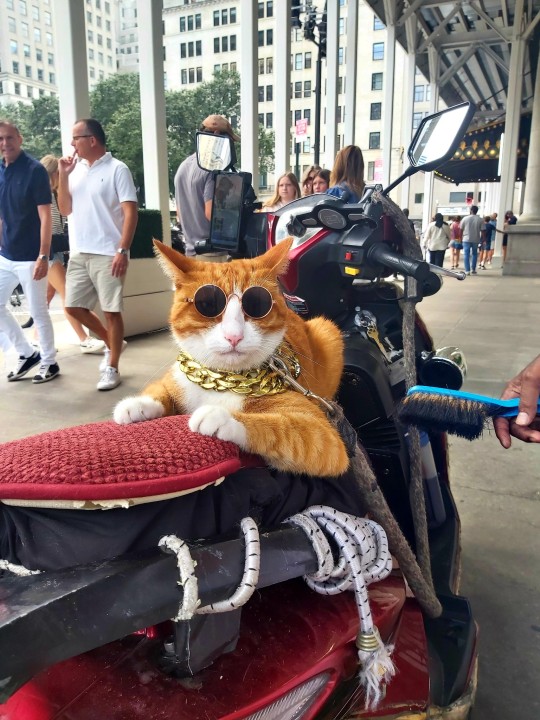
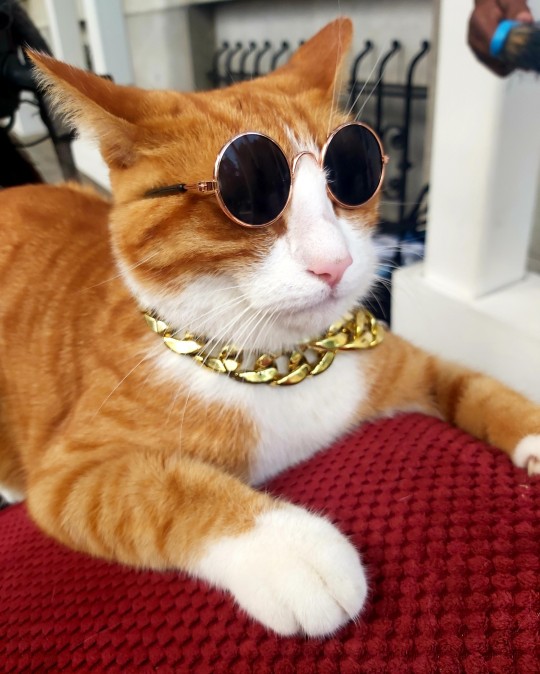
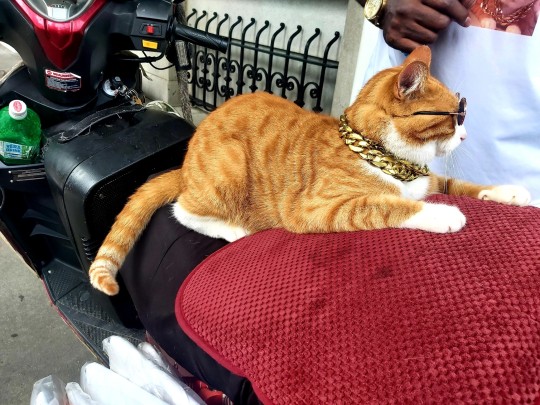
I proprietari di cani avranno notato che se forniscono cibo, acqua, riparo e affetto ai loro cani, questi penseranno che i loro proprietari siano delle divinità. Mentre i proprietari di gatti sono costretti a rendersi conto che se forniscono cibo, acqua, riparo e affetto ai loro gatti, questi traggono la conclusione di essere delle divinità.
.
Christopher Hitchens
67 notes
·
View notes
Text
The Guardian: A life in feuds: how Gore Vidal gripped a nation

From the start of his career in the late 1940s, he looked around to see who else was getting attention, and it irked him when others seemed to outflank him. Truman Capote certainly annoyed him, and he honed his talent for feuding with this feline young novelist from the American south whose first novel, Other Voices, Other Rooms, swept the bestseller lists in 1948. That same year, Vidal’s first major novel, The City and the Pillar, arrived noisily on the scene; one of the first American novels with an explicitly gay theme, it turned Vidal into something of a pariah in the literary establishment.
Theirs was a minor squabble, with neither side missing a chance to make a joke about the other. But the feud expanded in the 60s, after Vidal had been – according to Capote, in an interview with Playgirl – tossed out of the White House by Bobby Kennedy because he was “drunk and obnoxious”. In fact Kennedy had taken offence at Vidal’s apparent intimacy with Jacqueline Kennedy – the first lady was distantly related to Vidal by marriage – and the writer had left in a huff. Vidal sued Capote over the remark, and Capote countersued. The legal case dragged on with Vidal winning in the end, though Capote had no money by then, so it was a Pyrrhic victory.
Vidal and Norman Mailer first met at a mutual friend’s Manhattan apartment in 1952. Mailer had made a huge splash with The Naked and the Dead, his bestselling novel of the Pacific war, frustrating Vidal, whose own war novel, Williwaw, had barely registered. The two young writers circled each other warily, and a complicated friendship began that would play out over the next five decades. The two had little in common.
The real trouble started in 1971, when Vidal chose to review Mailer’s incendiary book about the feminist movement, The Prisoner of Sex. He dismissed Mailer, combining him with two other macho men, Henry Miller and the murderer Charles Manson, to create a single male aggressor and sexist pig he called “M3”. Vidal wrote: “Women are not going to make it until M3 is reformed, and that is going to take a long time.”
Never, by his own admission, one to pass up the opportunity to be on television, Vidal accepted an offer from Dick Cavett to appear on his talk show with Mailer. In the green room, according to Mailer, Vidal put a warm hand on the back of his neck, a gesture that he interpreted as veiled aggression. Mailer answered with a not-so playful swipe on the cheek. Much to Mailer’s surprise, Vidal slapped him back. Then Mailer leaned forward like a boxer and, in a move that suggested to Vidal he had been drinking, winked before headbutting his cheek.
On the show, Mailer expressed his disapproval of Vidal, saying he was intellectually shameless. Somewhat clumsily, he described Vidal’s writing as “no more interesting than the stomach of an intellectual cow”. Vidal ignored him, offering an innocent smile. But Mailer attacked again, asking him why he didn’t, for once, speak to him directly instead of talking to the audience. Then he attacked Vidal for alluding to the fact that Mailer had stabbed his wife in 1960, calling him “a liar and a hypocrite”. Vidal didn’t flinch. Instead, he remained eerily calm when Mailer asked him to apologise for comparing him to Manson. “I would apologise if – if it hurts your feelings, of course I would,” said Vidal. Mailer replied: “No, it hurts my sense of intellectual pollution.” Vidal smiled serenely. “Well,” he said, “I must say that as an expert, you should know about such things.” The conversation grew ever more hostile, but – as anyone who watches a clip of this broadcast will notice – Vidal never lost control of himself. On the other hand, Mailer came off as a bully.
One night they [Vidal and Austen] attended a party for Princess Margaret, before going on to an expansive apartment owned by Lally Weymouth, a journalist and daughter of Katherine Graham, publisher of the Washington Post. More than 100 guests crammed together. “You could hardly breathe,” Austen recalled, “everyone standing shoulder to shoulder.” It was a glittering affair, with Mailer, Jackie Kennedy Onassis, JK Galbraith, Gay Talese, William Styron and Jerry Brown – Vidal’s future rival for a senate seat in California – among the guests.
What happened next varies according to the teller, but Austen’s version accords with that of others:
[Mailer] saw Gore surrounded by friends, everyone talking and laughing. Gore was in a good mood as Mailer moved right up to him, got in his face, and everybody around them fell pretty silent. It looked like trouble. Norman told Gore that he looked like an old Jew, and Gore shook his head. He didn’t want to get into anything with Norman. Then Mailer threw his drink in Gore’s face, right in his eyes, then hit him in the mouth with a punch, a kind of glancing uppercut. Gore was stunned, and he stepped back. He wiped a dribble of blood from his mouth with a handkerchief. Then Gore said, ‘Norman, once again words have failed you.’
In 1984, Mailer decided to call a truce, inviting Vidal to participate with him in a fundraising event in New York. “Our feud, whatever its roots for each of us,” he wrote to Vidal, “has become a luxury. It’s possible in years to come that we’ll both have to be manning the same sinking boat at the same time. Apart from that, I’d still like to make up. An element in me, absolutely immune to weather and tides, runs independently fond of you.”
This was never the case with William F Buckley, who was Satan as far as Vidal was concerned: a vicious rightwing polemicist who represented everything that was wrong with American society. Buckley was the quintessential US conservative of a certain stripe: Roman Catholic, Ivy League-educated, wealthy, with a mid-Atlantic accent that seemed to parody itself at times. He founded the National Review, a conservative magazine, in 1955 and used it as a platform to make himself the spokesman for laissez-faire, pro-business economics and a hard-nosed, anti-communist foreign policy. With his first book, a feisty memoir called God and Man at Yale (1951), he had laid down the gauntlet, helping to set in motion the movement that eventually led to Ronald Reagan’s presidency.
Their most infamous confrontation came in 1968, events now captured in the feature-length documentary film Best of Enemies. A few months prior to the presidential nominating conventions that year, Vidal was asked to appear in a series of 10 prime-time television debates with Buckley, moderated by Howard K Smith, one of the most respected journalists in the country. This promised to be the intellectual and political fight of the decade, and Vidal took it very seriously. “He was like a prize fighter getting ready for the big fight,” recalled Austen. In his hotel suite, Vidal made elaborate notes on hot topics such as the Vietnam war, housing for the poor and the constitutional rights of assembly for protest. He knew Buckley would come well-armed with statistics and Jesuitical arguments, and planned to fire back with everything he could muster.
[Vidal] talked about the repressive treatment of protesters, alluding to the riots on the streets outside the convention centre. Buckley interrupted him, recalling the time George Lincoln Rockwell, a leader of the American Nazi Party, had marched with his followers into a small town in Illinois. They had been turned away, and Buckley thought this had been justified by the unusual circumstances. Taking the cue, Vidal jabbed at Buckley: “As far as I’m concerned, the only pro- or crypto-Nazi I can think of is yourself.” It was a deadly assertion, and Buckley curled his lip and sneered: “Now listen, you queer! Stop calling me a crypto-Nazi or I’ll sock you in your goddamn face and you’ll stay plastered.”
A later feud involved Christopher Hitchens, the English journalist and flamethrower who, in his early days as a leftwing polemicist, modelled himself partly on Vidal. “He wants to be me,” Vidal would often say, once designating Hitchens, whom he affectionately called Hitchy-Poo or, more often, The Poo, as his successor. In a witty counter-move, Hitchens printed some words by Vidal on the cover of his memoir, Hitch-22: “I have been asked whether I wish to nominate a successor, an inheritor, a dauphin or delfino. I have decided to name Christopher Hitchens.” The quotation is crossed out, with a handwritten note beside it: “No. CH.”
“He’s gone mad, our Poo,” he said to me one evening in the winter of 2010, after Hitchens published a nasty piece about him in Vanity Fair called “Vidal Loco”.
(Full article)
#gore vidal#truman capote#andré gide#norman mailer#william f. buckley#christopher hitchens#history#gay history#lgbt history#lgbtq history#literature#lit#gay literature#lgbt literature#lgbtq literature#bookblr#gay#lgbt#lgbtq#lgbtqia
17 notes
·
View notes
